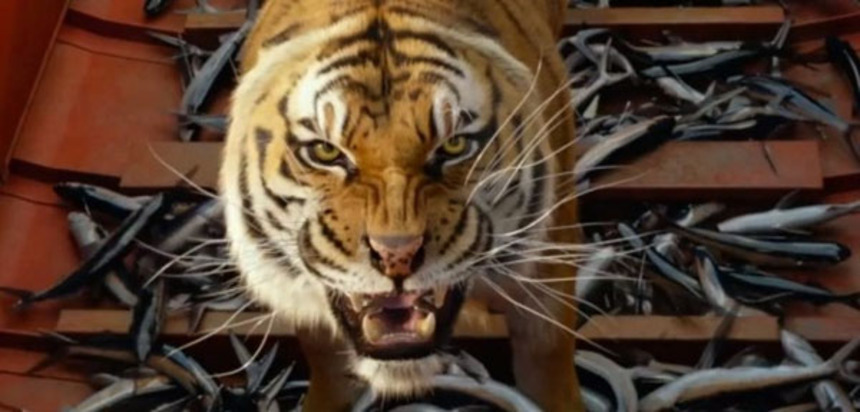Review: LIFE OF PI is Beautiful, Allegorical, Irrational, and Effective

In his fine review of Life of Pi from the New York Film Festival -- which represented an unfinished version that still required some "tweaking" -- ScreenAnarchy's Christopher Bourne points out that the story is drawn from a book "long considered impossible to film". At this point, I'm not sure what works are considered "unfilmable" - certainly modern filmmaking techniques allow even the most extraordinary of visual delights to appear on screen, and capable screenwriters are able to craft unique experiences while still maintaining the spirit of the original work, even if in altered form.
Too often "unfilmable" is an excuse for poor source material, where recent works like Cosmopolis illustrate that a perfectly fine film is undercut by a perfectly appalling narrative drawn word-for-word from the source material. I can't speak to the effectiveness of translating the book to screen in this instance, nor bemoan any subtleties lost in translation. I can only say unequivocally that Life of Pi exceeded my (lowered) expectations by a considerable amount, and is easily one of the best films of this year.
Consider me jaded, but despite having a soft spot for the films of Ang Lee, the thought of a Titanic-meets-We Bought a Zoo shtick filled me with dread, and the plastic-looking trailers and twee posters did little to instill confidence. I figured I was in for some stupid New Age claptrap where I'd suffer with some grand metaphor for two hours, having its plot points beaten into my head.
Luckily for I'd already seen that film earlier this year, and it's called Midnight's Children.
As for my very real trepidation about seeing Life of Pi,
my fears could not have been more misguided. The film is in all senses of the word fantastic.
Bourne suggests that "much of this near-visionary material is shackled to a ham-handed screenplay - by David Magee - with a rickety construction and an unfortunate tendency to telegraph its religious and philosophical themes with unsubtle and simplistic bullet points." I found the opposite to be the case; for me the screenplay was quite deft at being heavy handed when it was meant to do so, and quite subtle and effective when called for. The issues that could be interpreted as telegraphic were, for me, arch, the kind of raw narrative motifs that have people dropping "Joseph Campbell" and "Hero's Journey" into polite conversation. Given the explicitly scattershot "religiosity" embraced by the film, this buffet-style mysticism is seen at once as comical and surprisingly effective, drawing upon the narratological conceits of these practices of belief in order to shape a simple yet rich allegory.
Sure, to Christopher's point about the script, there's a little bit too much back-and-forth between timelines, and our central "reporter" character seems more than a bit oblivious. But these are minor quibbles, hardly distracting from the main focus of the film as an engaging story.
We both agree on the sumptuous nature of the film's visuals - again, the trailer makes the film look like some preposterous New Age video game, but Lee proves his mettle once again (clips of Crouching Tiger, Hidden Dragon may have made that film look silly as well, and there's few that would argue against the breathtaking beauty of that picture). For those who hate 3D, they should suck it up and give this film a try - this is a supreme example of a filmmaker using the device in both subtle and exaggerated ways in equal measure. At one moment, the aspect ratio of the film is changed to emphasize flying fish, while at other times the dimesionalization is subtle enough that it never calls attention to the technique.
As noted above, Mr. Bourne mentioned that "the New York Film Festival screenings were not of the final edit; Ang Lee said at Friday's press conference that some 'final tweaking' was still being done." While I can't speak to the specific differences in the cut we saw, I can assure that there was very little that could be considered 'clunky,' the film never overstaying its welcome.
From the supremely well executed water footage to near-perfect representations of digital creatures, this is a boon for any fan of modern effects (both VFX and practical), and illustrates just how magical modern filmmaking can be. Yet it is in the core performances, particularly from the two π s, Irrfan Khan and the truly remarkable newcomer Suraj Sharma, where much of the film's success lies.
In answer to the film's central question, this is exactly the type of story I like to be told, in all its facets and complexities, and I'm thankful for those that helped in the telling of it.
Life of Pi opens wide in theaters across North America on Wednesday, November 21. Check local listings for locations and showtimes.
Life of Pi
Director(s)
- Ang Lee
Writer(s)
- Yann Martel (novel)
- David Magee (screenplay)
Cast
- Suraj Sharma
- Irrfan Khan
- Ayush Tandon
- Gautam Belur







